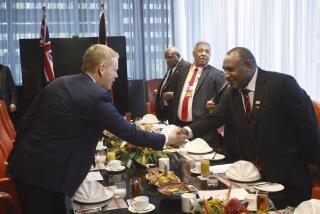Shultz Blasts New Zealand Port Ban
- Share via
SAN FRANCISCO — Secretary of State George P. Shultz, seeking to prevent a spread of nuclear hypersensitivity among U.S. allies, said Monday that New Zealand’s ban on port calls by nuclear-capable U.S. warships “can only encourage those who hope to tear at the fabric of Western cooperation.”
Shultz spoke to the annual meeting of the ANZUS Pact, the 35-year-old alliance of Australia, New Zealand and the United States that is coming apart under the pressure of New Zealand’s refusal to let U.S. ships capable of carrying nuclear weapons visit its ports.
Australian Foreign Minister Bill Hayden, striking a middle ground between his nation’s two closest allies, said that he is “deeply disappointed” that the United States and New Zealand have been unable to settle their differences after two years of increasingly frosty negotiations.
In a joint communique issued after the meeting (New Zealand was not invited), Australia joined the United States in asserting “that access for allied ships and aircraft is essential to the effectiveness of the ANZUS alliance, and that New Zealand’s current policies detract from individual and collective capacity to resist armed attack.”
“The Australian government repeated the view it had expressed consistently over the last two years that it disagreed completely with New Zealand’s policy on port and air access and expressed its understanding of the action which the United States had taken,” the communique said.
Breach Made Formal
Shultz told New Zealand Prime Minister David Lange last June that Washington was no longer obligated to come to New Zealand’s defense in time of war. In his speech Monday, Shultz made the breach formal: “Because of New Zealand’s decision to renege on an essential element of its ANZUS participation, it has become impossible for the United States to sustain its security obligations to New Zealand.”
The formal communique added that the United States “is suspending its security obligations to New Zealand.” The communique said that because of the New Zealand policy, “virtually all trilateral activities under (the treaty) have been suspended.”
The alliance will continue to be known as ANZUS, an acronym for Australia, New Zealand and the United States, but from Washington’s standpoint, it has now become a two-country organization of the United States and Australia.
U.S. officials have said the United States reacted decisively to New Zealand’s action because of concern that other U.S. allies, under pressure from anti-nuclear public opinion, might adopt a similar stance.
A ban on U.S. nuclear weapons in Europe or Japan would be far more troublesome to U.S. strategic planners than the prohibition on ship visits to New Zealand.
No Confirmation or Denial
As a matter of policy, the United States will neither confirm nor deny whether its ships or aircraft are carrying nuclear weapons. So far, New Zealand is the only ally to insist on receiving assurances that ships are not nuclear-armed.
The dismembering of ANZUS took place at the Presidio of San Francisco, the same site where the pact was signed Sept. 1, 1951. Thirty-five years ago, the objective was to reassure Australia and New Zealand of a continuing U.S. security interest in the South Pacific where the three allies had fought a bitter war against Japan.
Hayden, in his speech, spoke with sorrow of the U.S.-New Zealand breach. But he delivered a strong denunciation of U.S. plans to sell wheat to the Soviet Union at taxpayer-subsidized bargain prices. And he said that legislation pending in Congress to extend the subsidy to other farm products and other countries would make the situation even worse.
He asked Shultz and Defense Secretary Caspar W. Weinberger to tell the President and Congress that Australia feels “genuine outrage” at the subsidies, which could damage Australia’s own agricultural exports.
“Please tell them that there are questions being asked by people throughout Australia, where support for the alliance has been strong and deep for decades,” Hayden said. “Is this the way the Congress of the United States treats old and firm allies?
‘We Appreciate Your Problems’
“I will ask you to pass to Congress a simple request: We appreciate you have your own problems, but don’t try to solve them at the expense of allies and friends of the United States,” he said.
More to Read
Sign up for Essential California
The most important California stories and recommendations in your inbox every morning.
You may occasionally receive promotional content from the Los Angeles Times.













